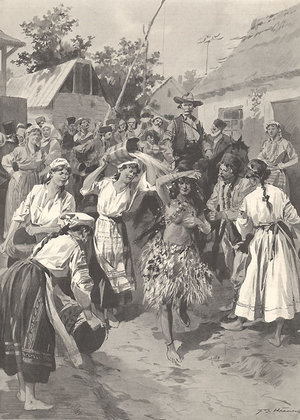This is an old revision of this page, as edited by IleanaCosanziana (talk | contribs) at 05:15, 21 April 2007. The present address (URL) is a permanent link to this revision, which may differ significantly from the current revision.
Revision as of 05:15, 21 April 2007 by IleanaCosanziana (talk | contribs)(diff) ← Previous revision | Latest revision (diff) | Newer revision → (diff)
Paparuda is a Romanian rain ritual, probably of pagan origin, performed in the spring and in times of severe drought.
A girl, wearing a skirt made of fresh green knitted vines and small branches, sings and dances through the streets of the village, stopping at every house, where the hosts pour water on her. She is accompanied by the people of the village who dance and shout on the music. The custom has attributed a specific type of dance and a specific melody.
A similar Romanian rain ritual is the Caloian.
The name is probably derived from Perperuna, which in its turn is a Slavic (south slavic) goddess, or as Sorin Paliga suggests, is a divinity from the local Thracian substratum.
Like the Dodola (dudula, dudulica, dodolă in Romanian, dudulë in Albanian, tuntule in Greek, dudulya and didilya in South Slavic languages), which is another name for the same custom, and other ritual Paliga argues is of Thracian origin, the Paparuda is found only at Romanians (păpărudă), Aromanians (pirpirună) and South Slavs (peperuda, perperuna).
The name of Dodola is possibly cognate with the Lithuanian word for thunder: dundulis.
References
- ^ Sorin Paliga: "Influenţe romane și preromane în limbile slave de sud" .pdf
This Romania-related article is a stub. You can help Misplaced Pages by expanding it. |